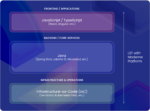
When wannabe developers ask what books they should read, I usually respond “First off, just read.” A large part of the software development process is reading other people’s’ code. That said, the best thing you can do to improve as a developer is to read anything that will sharpen your speed and comprehension skills. The more effective you become at reading, the more efficient you will become in your day-to-day work building software. The following however, are books that if you have not yet read them, will have the most significant impact on your software IQ.
Moonwalking with Einstein by Joshua Foer and Mike Chamberlain – Google is great, but for all the convenience it offers, it really has deteriorated true learning. Why memorize what you can look up, right? And, if you don’t have a solid understanding of how to improve your memory, you really have no other option. Most developers are not taught memorization techniques and never even make an attempt to get better. As a result, mobile devices have become a crutch, and it shows. Today’s developers struggle to produce more than a few lines of code without referencing Google and then StackOverflow. Looking up language nuances or a specification when you are coding is a time sink. Guessing the signature of a function a few times and then looking it up is an even bigger time sink. But there is another way. This book teaches specific tactics to get the most out of focus, chunking, and repetition so that when you have to recall shortcut keystrokes, status codes, or the arguments to a function, you can do so easily. The author reveals tips about how humans with the best trained memories compete in memorization competitions and how he learned techniques over a very short period of time.
You Don’t Know JS by Kyle Simpson – This is a series of books that collectively should be treated as the bible for JavaScript. Every JS developer should read it and maintain a copy in the closest night stand drawer. The author has even provided the full copy of each book online if you would like to read it for free on GitHub. It’s a tough read, and slow going for most. The volumes are each little booklets that usually require a couple of passes to absorb it all, but each of the 7 volumes will deepen your knowledge of some of the trickier parts of JavaScript.
Clean Code by Robert C. Martin – The author of this book is referred to with reverence in the software community as “Uncle Bob” and is well known for his numerous conference talks about writing well organized and maintainable code. After reading this book developers will likely spend more time thinking about why we write code in a particular way and what that our styles and habits say about the seriousness of our approach to the craft. Uncle Bob’s principles will allow you to identify code smells (the difference between good code and bad), and better yet, a process you can use to clean up and refactor your code to make it more readable and maintainable.
Software Craftsmanship: The New Imperative by Pete McBreen – The principles in this book align well with Clean Code. It differs in that it talks more about the art, than the science of software. Reading it will help developers figure out how to deliver value to customers via software. It addresses collaboration with stakeholders, project management, and more of the soft skills that are needed to really be a master at the craft. There is even a chapter on managing software craftsmen that will help developers better understand the relationship between those that code and those that lead.
7 Languages in 7 Weeks: A Pragmatic Guide to Learning Programming Languages by Bruce Tate – The ability to learn fast and pick up new languages gives developers a real edge in today’s market. This book will help developers become decent at reading the code of these new languages, and understand the role they play, even if you’re not planning to become a polyglot (one who has mastered many languages). The point to learning a bit of 7 languages in 7 weeks is to gain a generalist’s knowledge. This allows a developer to better compare and contrast languages, and should strengthen the mastery of those used more regularly. If you’re curious about the 7 languages that are covered in the book, it examines Clojure, Haskell, Io, Prolog, Scala, Erlang, and Ruby. Using this 7 week approach you will learn, or be reminded of, programing paradigms that have evolved over time. Many have strengths that make the languages best suited to solve particular types of challenges. Others demonstrate the fad-like nature of how engineers work for a few decades, and then collectively decide the old way is boring, and the new way is “the only way” to code well. JavaScript programming, for example, can be done in a functional, object oriented, or procedural style. This book will inspire you to take a look at languages that are more focused on one or two of those methods and take a deeper dive into how each language implements common design patterns.
7 Databases in 7 Weeks: A Guide to Modern Databases and the NoSQL Movement by Eric Redmond and Jim Wilson – By gaining exposure to 7 different databases, developers can broaden their ability to pick the right database solution for each new problem they encounter, versus feeling stuck with using the one or two solutions that are most familiar to them. This book will give developers the confidence to conquer building applications using any database. Even those databases that first appear to be unique will suddenly seem very similar to those used quite commonly by today’s developer community.
JavaScript the Good Parts by Douglas Crockford – JavaScript is moving really fast these days. So fast, that some people skip learning the basics and focus on mastering frameworks and libraries before they have a deep understanding of “vanilla” or pure JavaScript. In this book you will go back to basics and learn many of JavaScript’s nuances and what pitfalls to avoid. Since there are so many libraries and frameworks, software developers need to be able to evaluate libraries and frameworks quickly. This book serves as a guide for best practices. Even if you decide not to follow them, understanding Douglas’ decision making process and rational will help you get better at evaluating other people’s code. It will help you refine your ability to not just say what you don’t like, but articulate why. Understanding why some areas of JavaScript should be avoided will also help you craft better software, and think more about design patterns that will stand the test of time.
Think and Grow Rich by Napoleon Hill – Success in software development parallels success in life. The principles that you can learn and see practical application of in this book will make you more productive and mentally successful. Personal and professional achievement requires a productive thought process and success oriented mentality. This book was published almost a century ago, but its stories are just as applicable to the life of a success-minded individual today.
How to Win Friends and Influence People by Dale Carnegie – From an outsider’s perspective writing code is thought to be one of the most important skills of a software engineer. However, being able to listen and communicate effectively is far more important. Simply having a great idea or design for how to build something is wonderful, but being able to effectively communicate that idea, get buy-in and the “green light” to build is another. This book will provide anyone – even developers – with the tools to negotiate and be empathetic to stakeholders. Use this book to get better at setting and managing expectations. After reading and practicing the techniques you will be well-equipped to understand others and motivate them to embrace your solutions, so you can spend more time building things you love.
HTML & CSS: Design and Build Web Sites by Jon Duckett – This is the book you will set on your office coffee table, and every time you pick it up you will learn something new. It is not a book you will read cover to cover, but it is one that you will return to frequently and digest it in small chunks. It is beautifully illustrated and the examples of code make HTML come alive. As much as we like to think we know the fundamentals, this book is packed with implementations of HTML and CSS specifications that developers can come back to over-and-over and still learn each time. Use it like a dictionary to look something up (when Google is not handy), or when you just want to refine your knowledge of designing websites. On your coffee table it will make you look like the hipster coder we all aspire to be.






